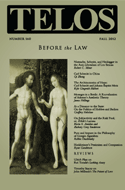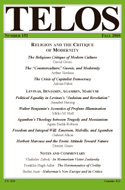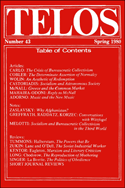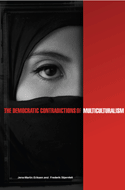By Robbie Duschinsky · Thursday, October 11, 2012 Robbie Duschinsky’s “Pure and Impure in the Philosophy of Giorgio Agamben” appears in Telos 160 (Fall 2012). Read the full version online at the Telos Online website, or purchase a print copy of the issue here.
 The issue of the “ambiguity of the sacred” plays a significant role in Giorgio Agamben’s thought. Both the importance of the pure and impure to Agamben, and the nature of his theory of this issue, are revealed more clearly in his recent text Il Sacramento del Linguaggio. In contrast to functionalist explanations of themes of purity and impurity as an expression and affirmation of the social order (e.g., Emile Durkheim, Mary Douglas), Agamben considers purity and impurity as essentializing discourses. They contribute to the establishment of a transcendent but empty ideal, as the mandate for the social and political governance of individuals. In the course of this analysis, Agamben offers many philosophical reflections on purity and impurity that will be of note to researchers across the social sciences and humanities. The issue of the “ambiguity of the sacred” plays a significant role in Giorgio Agamben’s thought. Both the importance of the pure and impure to Agamben, and the nature of his theory of this issue, are revealed more clearly in his recent text Il Sacramento del Linguaggio. In contrast to functionalist explanations of themes of purity and impurity as an expression and affirmation of the social order (e.g., Emile Durkheim, Mary Douglas), Agamben considers purity and impurity as essentializing discourses. They contribute to the establishment of a transcendent but empty ideal, as the mandate for the social and political governance of individuals. In the course of this analysis, Agamben offers many philosophical reflections on purity and impurity that will be of note to researchers across the social sciences and humanities.
Continue reading →
By Katherine McGinity · Tuesday, October 9, 2012 As an occasional feature on TELOSscope, we highlight a past Telos article whose critical insights continue to illuminate our thinking and challenge our assumptions. Today, Katherine McGinity looks at Dimitri Ginev’s “The Erotic Attitude Toward Nature and Cognitive Existentialism” from Telos 152 (Fall 2010).
 Dimitri Ginev’s “The Erotic Attitude Toward Nature and Cognitive Existentialism” seeks to uncover ways in which Herbert Marcuse’s call for a “new science” could be achieved in current scientific research. Marcuse’s ideas are committed to an “erotic” attitude toward nature that moves away from the technological rationality that drives scientific research. Marcuse posits that engaging in an erotic attitude toward nature would allow natural entities to “be what they are” and reveal their inherent aesthetic qualities. According to Marcuse, this dramatic shift in scientific research would change essentialist thinking about science and its norms of objectivity. Ginev shares Marcuse’s feeling that current scientific research methods are problematic in their reductive approach to nature as something that can be controlled and manipulated. However, Ginev points out that attempting to dismantle the subjective-objective structure of modern science proves difficult based solely in Marcuse’s outline. Dimitri Ginev’s “The Erotic Attitude Toward Nature and Cognitive Existentialism” seeks to uncover ways in which Herbert Marcuse’s call for a “new science” could be achieved in current scientific research. Marcuse’s ideas are committed to an “erotic” attitude toward nature that moves away from the technological rationality that drives scientific research. Marcuse posits that engaging in an erotic attitude toward nature would allow natural entities to “be what they are” and reveal their inherent aesthetic qualities. According to Marcuse, this dramatic shift in scientific research would change essentialist thinking about science and its norms of objectivity. Ginev shares Marcuse’s feeling that current scientific research methods are problematic in their reductive approach to nature as something that can be controlled and manipulated. However, Ginev points out that attempting to dismantle the subjective-objective structure of modern science proves difficult based solely in Marcuse’s outline.
Continue reading →
By Brendan O'Connor · Friday, October 5, 2012
-
Two essays on pop culture: Kevin Craft explores the development of its representations of the liberal arts for The Atlantic, and Andrew O’Hehir explores its relationship to the American Right for Salon. In some ways, these two articles seem to describe conflicting trends. Is this the case, or is there a connection?
-
Also at The Atlantic, Conor Friedersdorf, with assistance from Orwell, unpacks medical metaphors in the military.
-
Hugo Koning reviews Emma Stafford’s Herakles, the latest installment in the Routledge series Gods and Heroes of the Ancient World, for the Bryn Mawr Classical Review: “Just as on the divine plane ‘everything begins with Zeus,’ so on the human plane almost all heroes of different generations, tales and locations are somehow connected to Herakles.”
Continue reading →
By Tomash Dabrowski · Tuesday, October 2, 2012 As an occasional feature on TELOSscope, we highlight a past Telos article whose critical insights continue to illuminate our thinking and challenge our assumptions. Today, Tomash Dabrowski looks at Richard Wolin’s “An Aesthetic of Redemption: Benjamin’s Path to Trauerspiel“ from Telos 43 (Spring 1980).
 Despite renewed interest in Walter Benjamin, his work still remains enigmatic seventy years after his death, and the obscurity of his thought is compounded by the efforts of friends and associates wishing to reclaim his work to their respective traditions. Those who knew him during his lifetime—and especially those instrumental to the belated dissemination of his work—sometimes repudiate his theological motifs, others his particular variant of Marxism (or questioning whether he could be called a Marxist at all). But there seems to be a consensus as to their incongruity. Adorno for instance once chastised Benjamin’s work as “undialectical,” and Gershom Scholem found his theology to be plagued by ill-conceived communist alliances (which is to say nothing about his dispute with Hannah Arendt about which school of thought Benjamin’s contribution legitimately lies). Leszek Kołakowski’s reading, in his eminent Main Currents of Marxism, is emblematic of the mischief caused by measuring Benjamin’s work against the weight of tradition. Kołakowski finds that Benjamin “seems to have tried to graft historical materialism on his own theory of culture, which had nothing to do with Marxism and which he had worked out beforehand.” Despite renewed interest in Walter Benjamin, his work still remains enigmatic seventy years after his death, and the obscurity of his thought is compounded by the efforts of friends and associates wishing to reclaim his work to their respective traditions. Those who knew him during his lifetime—and especially those instrumental to the belated dissemination of his work—sometimes repudiate his theological motifs, others his particular variant of Marxism (or questioning whether he could be called a Marxist at all). But there seems to be a consensus as to their incongruity. Adorno for instance once chastised Benjamin’s work as “undialectical,” and Gershom Scholem found his theology to be plagued by ill-conceived communist alliances (which is to say nothing about his dispute with Hannah Arendt about which school of thought Benjamin’s contribution legitimately lies). Leszek Kołakowski’s reading, in his eminent Main Currents of Marxism, is emblematic of the mischief caused by measuring Benjamin’s work against the weight of tradition. Kołakowski finds that Benjamin “seems to have tried to graft historical materialism on his own theory of culture, which had nothing to do with Marxism and which he had worked out beforehand.”
Continue reading →
By Brendan O'Connor · Friday, September 28, 2012
-
Gary Gutting responds to Bertrand Russell and Adam Smith on work, leisure, and value for The Stone.
-
Timothy Spangler reviews Wealth and Poverty: A New Edition for the Twenty-First Century and Free Market Revolution: How Ayn Rand’s Ideas Can End Big Government for the Los Angeles Review of Books: “Many of the same post-War thinkers are referenced, and in many ways the two books complement each other—one a large dense and highly ornamented Wagner opera, the other a memorable Broadway show with tunes you can hum during the cab ride home.”
-
Anthony Gottlieb explores evolutionary psychology’s “Just So Stories” for the New Yorker.
Continue reading →
Writing in City Journal, Jens-Martin Eriksen and Frederik Stjernfelt discuss the parallels between the recent violence and protests regarding the anti-Islam film The Innocence of Muslims and the Danish cartoon controversy six years ago:
 In the current Mohammed film crisis, certain patterns repeat themselves from the crisis over the Danish cartoons six years ago. In both cases, Middle East Islamists seized on a marginal piece of anti-Islam criticism to put pressure on the West—and on more moderate forces in their own countries. In the current Mohammed film crisis, certain patterns repeat themselves from the crisis over the Danish cartoons six years ago. In both cases, Middle East Islamists seized on a marginal piece of anti-Islam criticism to put pressure on the West—and on more moderate forces in their own countries.
The Western reaction is also familiar, particularly in its understanding of the Middle East as a bonfire waiting to happen and criticism of Islam as the spark that ignites it. Descriptions of the YouTube film (a trailer, actually) that “sparked protests in many Muslim countries”—as the New Yorker put it in a typical formulation—rely on this false metaphor. It suggests that the protests are spontaneous occurrences that would not have come about without such a spark, and that the demonstrating Muslims are primitive savages governed by passion, not responsible for their own actions. The only parties with control over their actions are the filmmakers.
Continue reading →
|
|
 The issue of the “ambiguity of the sacred” plays a significant role in Giorgio Agamben’s thought. Both the importance of the pure and impure to Agamben, and the nature of his theory of this issue, are revealed more clearly in his recent text Il Sacramento del Linguaggio. In contrast to functionalist explanations of themes of purity and impurity as an expression and affirmation of the social order (e.g., Emile Durkheim, Mary Douglas), Agamben considers purity and impurity as essentializing discourses. They contribute to the establishment of a transcendent but empty ideal, as the mandate for the social and political governance of individuals. In the course of this analysis, Agamben offers many philosophical reflections on purity and impurity that will be of note to researchers across the social sciences and humanities.
The issue of the “ambiguity of the sacred” plays a significant role in Giorgio Agamben’s thought. Both the importance of the pure and impure to Agamben, and the nature of his theory of this issue, are revealed more clearly in his recent text Il Sacramento del Linguaggio. In contrast to functionalist explanations of themes of purity and impurity as an expression and affirmation of the social order (e.g., Emile Durkheim, Mary Douglas), Agamben considers purity and impurity as essentializing discourses. They contribute to the establishment of a transcendent but empty ideal, as the mandate for the social and political governance of individuals. In the course of this analysis, Agamben offers many philosophical reflections on purity and impurity that will be of note to researchers across the social sciences and humanities.  Dimitri Ginev’s “The Erotic Attitude Toward Nature and Cognitive Existentialism” seeks to uncover ways in which Herbert Marcuse’s call for a “new science” could be achieved in current scientific research. Marcuse’s ideas are committed to an “erotic” attitude toward nature that moves away from the technological rationality that drives scientific research. Marcuse posits that engaging in an erotic attitude toward nature would allow natural entities to “be what they are” and reveal their inherent aesthetic qualities. According to Marcuse, this dramatic shift in scientific research would change essentialist thinking about science and its norms of objectivity. Ginev shares Marcuse’s feeling that current scientific research methods are problematic in their reductive approach to nature as something that can be controlled and manipulated. However, Ginev points out that attempting to dismantle the subjective-objective structure of modern science proves difficult based solely in Marcuse’s outline.
Dimitri Ginev’s “The Erotic Attitude Toward Nature and Cognitive Existentialism” seeks to uncover ways in which Herbert Marcuse’s call for a “new science” could be achieved in current scientific research. Marcuse’s ideas are committed to an “erotic” attitude toward nature that moves away from the technological rationality that drives scientific research. Marcuse posits that engaging in an erotic attitude toward nature would allow natural entities to “be what they are” and reveal their inherent aesthetic qualities. According to Marcuse, this dramatic shift in scientific research would change essentialist thinking about science and its norms of objectivity. Ginev shares Marcuse’s feeling that current scientific research methods are problematic in their reductive approach to nature as something that can be controlled and manipulated. However, Ginev points out that attempting to dismantle the subjective-objective structure of modern science proves difficult based solely in Marcuse’s outline.  Despite renewed interest in Walter Benjamin, his work still remains enigmatic seventy years after his death, and the obscurity of his thought is compounded by the efforts of friends and associates wishing to reclaim his work to their respective traditions. Those who knew him during his lifetime—and especially those instrumental to the belated dissemination of his work—sometimes repudiate his theological motifs, others his particular variant of Marxism (or questioning whether he could be called a Marxist at all). But there seems to be a consensus as to their incongruity. Adorno for instance once chastised Benjamin’s work as “undialectical,” and Gershom Scholem found his theology to be plagued by ill-conceived communist alliances (which is to say nothing about his dispute with Hannah Arendt about which school of thought Benjamin’s contribution legitimately lies). Leszek Kołakowski’s reading, in his eminent Main Currents of Marxism, is emblematic of the mischief caused by measuring Benjamin’s work against the weight of tradition. Kołakowski finds that Benjamin “seems to have tried to graft historical materialism on his own theory of culture, which had nothing to do with Marxism and which he had worked out beforehand.”
Despite renewed interest in Walter Benjamin, his work still remains enigmatic seventy years after his death, and the obscurity of his thought is compounded by the efforts of friends and associates wishing to reclaim his work to their respective traditions. Those who knew him during his lifetime—and especially those instrumental to the belated dissemination of his work—sometimes repudiate his theological motifs, others his particular variant of Marxism (or questioning whether he could be called a Marxist at all). But there seems to be a consensus as to their incongruity. Adorno for instance once chastised Benjamin’s work as “undialectical,” and Gershom Scholem found his theology to be plagued by ill-conceived communist alliances (which is to say nothing about his dispute with Hannah Arendt about which school of thought Benjamin’s contribution legitimately lies). Leszek Kołakowski’s reading, in his eminent Main Currents of Marxism, is emblematic of the mischief caused by measuring Benjamin’s work against the weight of tradition. Kołakowski finds that Benjamin “seems to have tried to graft historical materialism on his own theory of culture, which had nothing to do with Marxism and which he had worked out beforehand.”  In the current Mohammed film crisis, certain patterns repeat themselves from the crisis over the Danish cartoons six years ago. In both cases, Middle East Islamists seized on a marginal piece of anti-Islam criticism to put pressure on the West—and on more moderate forces in their own countries.
In the current Mohammed film crisis, certain patterns repeat themselves from the crisis over the Danish cartoons six years ago. In both cases, Middle East Islamists seized on a marginal piece of anti-Islam criticism to put pressure on the West—and on more moderate forces in their own countries. 

